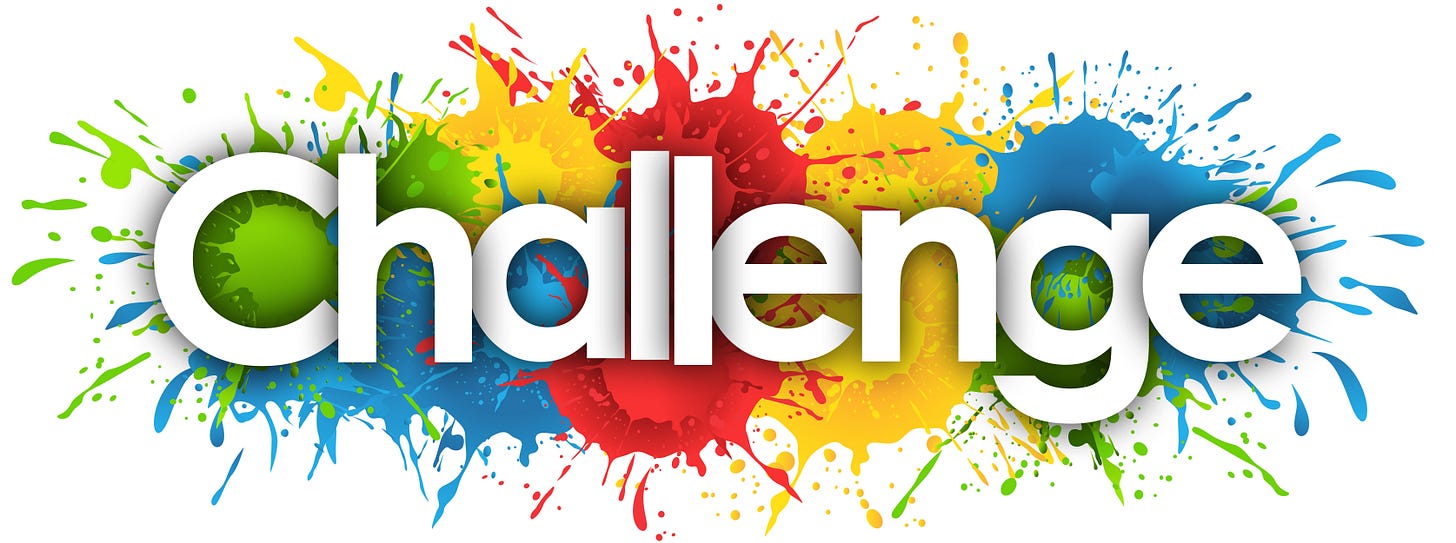Before I post today’s challenge, I want to thank everyone who sent in answers for Challenge 2: Book Banning. A lot of the responses echoed each other, so here are the best responses we’ve received so far:
Why book banning should be allowed
Some books contain sensitive material that could negatively impact vulnerable individuals, such as young children or those who have had traumatic experiences.
Those who seek to ban books do so out of good intentions to protect others from perceived harm.
Book banning prevents the spread of misinformation.
Banning dangerous books alleviates fear and helps people believe they’ve made the world safer.
Selectively banning books that teach, encourage, or promote hate and violence, teach bomb making, or glorify criminals can save lives.
Why book banning should not be allowed
Banning books restricts the free flow of ideas and information.
To read is to grow; banning books hinders growth, a core human need.
Book banning is an ineffective way to protect the vulnerable.
Banning books deprives people knowing about diverse voices, experiences, identities, and historical and cultural perspectives, which impedes understanding and empathy.
Banning books encourages social, political, cultural, and religious polarization.
Do you agree or disagree with these responses? Let us know in the comments.
Commentary
“Those who support banning books are acting from a place of fear. They think they’re protecting others from harmful ideas. Or they’re lashing out in anger and hate—which is fear expressed outwardly. Thus, soothing fear would be a good strategy as a first step in responding to someone in favor of banning books.”
“The biggest thing I learned in this challenge is that the places I usually go for discussions on hard topics tend to argue why certain books should be banned or not. Nobody really talks about book banning as a practice other than the free speech vs protect the innocent framework. I had a hard time thinking of five reasons why book banning should be allowed, which obviously betrays my position.
Creative Analysis
1. CRITICAL THINKING
Pro Book Banning
Core: It’s necessary to remove certain knowledge and ideas from the public eye
Supporter emotional base: lust for power
Emotional intent: fear, outrage
Political intent: population control
Anti Book Banning
Core: open exchange/distribution of knowledge is fundamental to a free society
Supporter emotional base: defensive
Emotional intent: passion, outrage
Political intent: individual control
2. DEBATE PROTOCOL
Pro Book Banning
Response to: individualism
Emotional pushback against: loss of population control
Anti Book Banning
Response to: ruling/monied class attacks on established freedoms
Emotional pushback against: ruling/monied class
3. ABSTRACT REASONING
Pro Book Banning
Missing dots: the negative consequences of how restricting knowledge and choice benefits the ruling/monied class
Long-term consequences: diminishes innovation, thus maintaining global unrest; war is lucrative
Excessive dots: the need to protect children
Long-term consequences: grooms children to accept restrictions and autocracy
Anti Book Banning
Missing dots: the corresponding negative consequences of restricting uncomfortable or offending speech
Long-term consequences: nudges the public to accept restrictions and eventual censorship
Excessive dots: right to educate/groom children to their own beliefs and values
Long-term consequences: continued social/political/religious polarization
4. FOCUSED INGENUITY
Pro Book Banning
What if: book banning is Step 1 in eliminating ruling/monied class opposition. (This “what if” is already in operation, thus validating banning’s efficacy)
So what (why is it important): if banning doesn’t clear the path to subsequent controls, the cost of enacting further restrictions will continue to rise
Anti Book Banning
What if: individuals and entities created a volume of works presenting sufficient alternate perspectives, closeted realities, and real historical facts too large to be ignored, denied, or effectively banned
So what (why is it important): book banning’s long-term consequences are autocracy, “others” disenfranchisement, and eventual elimination of nonconforming or dissenting individuals
Challenge #3: Abortion
A: List five reasons why abortions should be legal.
1.
2.
3.
4.
5.
B: List five reasons why abortions should not be legal.
1.
2.
3.
4.
5.
Again, remember the rules:
Logical or fact-based answers only
No religious, faith-based, or proven untruths
Keep your answers brief; pleonasm will not be read
You may work with as many study buddies as you want
Talk to family, friends, co-workers, other people—especially those with which you don’t usually agree. Check out sources you’d normally never consider. And share your answers by next Wednesday so we can all become more literate, informed voters!
When you’re done, ask yourself: Did I learn anything?
Did my needle move?
You can send in your answers three ways
Email them to ruse2v@gmail.com | Subject: Challenge Answers. Your name and email will be confidential.
Use the submission form at https://rusmartenough2vote.com/submit-your-answers/. Your name and email will be confidential.
Leave them in a comment.
Have challenge questions of your own? Leave a comment or email me at ruse2v@gmail.com.
And don’t forget to share! Send this challenge to everyone in your personal and business networks. Let’s make these thought exercises the thing-to-do for the 2024 election!


